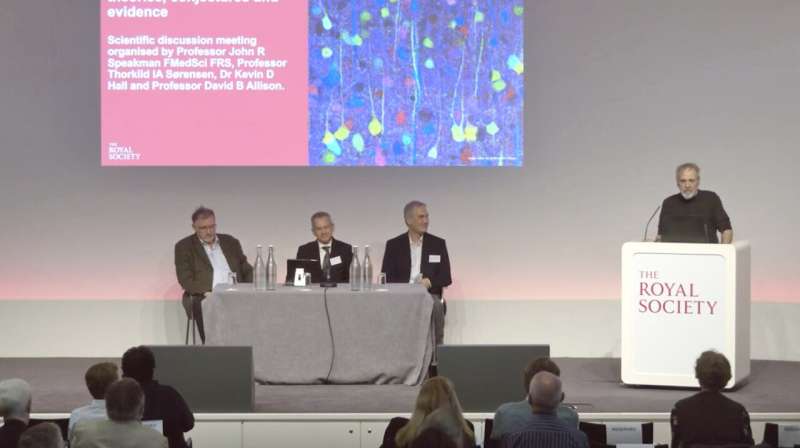This article has been reviewed according to Science X's editorial process and policies. Editors have highlighted the following attributes while ensuring the content's credibility:
fact-checked
peer-reviewed publication
trusted source
proofread
Global obesity battle stymied: Deeper understanding is needed, researchers say

Prof. John Speakman from the Shenzhen Institute of Advanced Technology (SIAT) of the Chinese Academy of Sciences, alongside Prof. Kevin Hall from the National Institutes of Health (U.S.), Prof. Thorkild Sorensen from the University of Copenhagen and Prof. David Allison from Indiana University (U.S.), has published a perspective article on potential mechanisms of obesity pathogenesis.
It was based on an academic conference held by The Royal Society, with experts and scholars in the field of obesity research discussing the potential pathogenesis of obesity. The article was published in Science.
Governments around the world have struggled to curb the rising obesity rates, with no signs of improvement. Despite strategies that have often focused on exercise promotion and junk food advertising bans, the issue proves more intricate than initially thought.
Misconceptions about obesity have hindered progress. It's evident that addressing obesity is not as straightforward as encouraging exercise and reduced energy intake. Genetics interacting with aspects of environment and physiology are all involved.
Recent advances in obesity research have been significant. Leptin, a hormone produced by fat cells, plays a pivotal role in regulating food consumption by triggering brain signals. The traditional view of adipose tissue as a passive storage unit has shifted to recognizing its active role in producing hormones that impact the entire body. However, despite these strides, the global still struggle against the expending waistline.
In this article, the four experts have distilled the key unanswered questions:
- How is body weight and adiposity regulated, and what factors influence this regulation? The intricate mechanisms behind powerful regulatory signals and their vulnerability remain unclear.
- How are the body's nutritional and energy demand accurately sensed, how do these signals are integrated in the brain to modulate energy balance, appetite and behavior?
- What mechanisms drive the impact of the food environment on body weight regulation? This encompasses broader environmental factors like social influences and the built environment.
- How do genetics and environmental factors interact to create individual variability in obesity susceptibility?
- Is obesity a single problem or does it encompass a range of other problems that should inform prevention and treatment strategies?
"It's evident that there are fundamental answers we should possess," said Prof. Speakman, lead author of the article. "Obesity is a health challenge. Acknowledging our progress, we must assess our current position and chart a course for the future works. Addressing these vital unanswered questions could serve as a roadmap for prioritizing research endeavors."
More information: John R. Speakman et al, Unanswered questions about the causes of obesity, Science (2023). DOI: 10.1126/science.adg2718





















